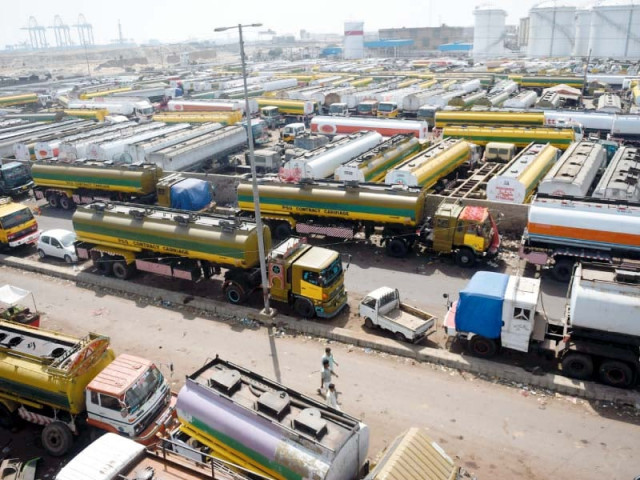Sindh cess delays fuel at port, triggers shortage fears
It could take up to two weeks to restore normal supply: OCAC

The enforcement of the Sindh Infrastructure Development Cess by the Sindh government has delayed the clearance of petroleum products at Karachi Port, creating fears of a nationwide shortage of fuel supplies.
The Oil Companies Advisory Council (OCAC) has written an urgent letter to the Sindh chief minister, alerting him to the situation. According to the OCAC, petroleum product cargoes currently being discharged, as well as ships anchored at ports, require immediate customs clearance. The letter stated that Pakistan State Oil's (PSO) oil tankers – MT Islam 2 and MT Hanifa – were berthed and awaiting customs clearance. It added that oil stocks at the Keamari oil terminal were depleting and the two vessels berthed at Karachi Port must be granted immediate clearance. "Only after customs clearance, the continuity of petroleum supply chain across the country can be ensured."
The letter warned that if Wafi Energy's petroleum cargo and Pak Arab Refinery's (Parco) crude oil cargo arriving at Karachi Port on October 21 were not cleared, the problem would deepen. The implementation of the infrastructure development cess has exposed the downstream petroleum industry to severe financial and operational risks. The 1.8% cess could raise the cost of petroleum products by more than Rs3 per litre, which will directly impact consumers, even though fuel prices are regulated.
According to the OCAC, the agriculture season is currently underway and under these circumstances, there is a risk that the supply of petroleum products across the country may come to a standstill. Even after the issue is resolved, it could take up to two weeks to restore normal supply. The OCAC urged the government to take immediate notice of the matter and address the crisis on an urgent basis.
In the letter, OCAC Chairman Abdul Sami Khan recalled that the governments of Sindh and Balochistan had imposed the Sindh Infrastructure Development Cess on POL (petroleum, oil and lubricant) imports since 1994. The levy was challenged before the Sindh High Court (SHC), which initially granted a stay but later upheld the collection of cess in 2021.
The industry appealed to the Supreme Court, which suspended the SHC order, but gave directives for the true protection of sub judice bank guarantees. The oil industry, in view of the past practice, did not furnish cess guarantees, which was allowed by the relevant authorities to ensure continuous oil supply.
In July 2023, the Sindh Sales Tax & Excise Department again restored the submission of local taxes and levies declaration before goods declaration. Following interventions by the Ministry of Energy (Petroleum Division) and the Oil and Gas Regulatory Authority (Ogra), an interim arrangement was reached that allowed the submission of an undertaking instead of bank guarantees.
While the matter remains sub judice – before the Supreme Court (Sindh) and the Balochistan High Court – the government has, however, reinstated bank guarantees for infrastructure cess at the time of goods declaration.
The energy ministry has repeatedly told the provincial governments that petroleum pricing is a federal domain; hence Punjab and K-P governments have exempted petroleum products from infrastructure cess under their respective laws.
According to the letter, the imposition of the Sindh infrastructure cess poses severe financial and operational risks to the downstream industry. Based on estimated cargo movements, a single 40,000-metric-ton vessel costs about $40 million.
WITH ADDITIONAL INPUT FROM ZAFAR BHUTTA



















COMMENTS (2)
Comments are moderated and generally will be posted if they are on-topic and not abusive.
For more information, please see our Comments FAQ